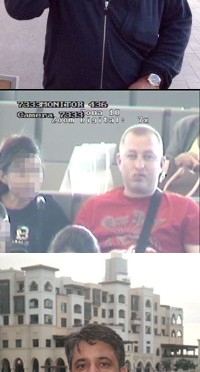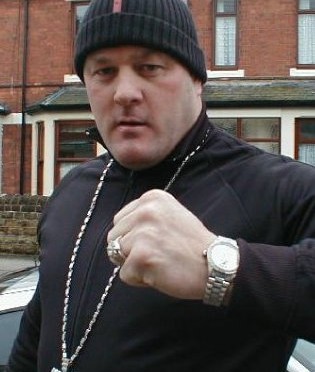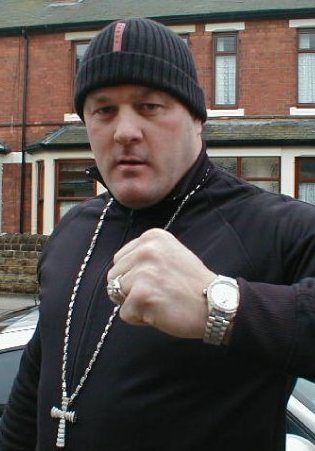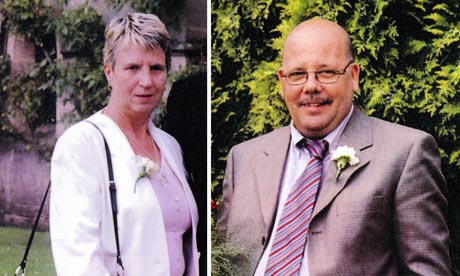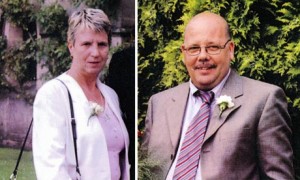 |
| (from the top) Nasr, Dawes, and Jamil Karzai |
The Afghan links to a very British organised crime group…………
FAMILY of the Afghan president Hamid Karzai have formed connections with a British gangster who is wanted for major drug trafficking and murder and has been conducting a money-laundering operation from Dubai.
A four month investigation by journalists has uncovered evidence that three nephews of the Afghan president – one of whom is a former Afghan MP and another is a government intelligence chief – are linked to Robert Dawes, a 39-year-old drugs kingpin who has figured in eight separate national UK crime investigations but has evaded capture.
Dawes, named by the Serious Organised Crime Agency (SOCA) in recent court documents as a “highly significant international criminal” is currently in prison in Dubai fighting extradition to Spain where the authorities want him to face trial over a 200-kilo haul of 82 per cent purity cocaine discovered outside Madrid in September 2007.
He is also wanted in Holland where he was named in court as the man who ordered the murder of an innocent school teacher, Gerard Meesters, in Groningen in November 2002. Meesters was targeted simply for being a relative of someone who had crossed Dawes.
Detectives in Britain are understood to want to interview Dawes about major drug trafficking in heroin and cocaine, money laundering and the unsolved murder in October 2002 of David Draycott from Sutton-in-Ashfield, Nottinghamshire, who like Meesters was assassinated at his home.
Dawes fled the UK for Spain nearly ten years ago and has spent much of his time shuttling between the Mijas Costa and Dubai. In the intervening period police swooped on members of his cartel, including his brother John and father, Arthur. Both were jailed in 2005 for drugs offences and money laundering.
Since 2007 Dawes has stayed in Dubai running a money-laundering operation. Dubai has long been considered a magnet for money-laundering, particularly in relation to Afghanistan, where much of the political elite has second homes.
It was at the centre of last year’s scandal over the misuse of Kabul Bank by its shareholders, who had been loaning to themselves in order to buy property there. The US embassy in Afghanistan estimates $10m a day leaves the country for Dubai, much of it the proceeds of illegal activity from the country’s heroin trade, the leading export of the country.
Reporters began investigating Dawes’ connections with the Karzai family in November last year after receiving information that Jamil Karzai, a nephew of the Afghan president, had been seen at Dawes offices meeting the Briton’s right-hand man, Raphael Nasr.
An undercover reporter approached Manchester-born Nasr, who is also on the radar of the SOCA and the Guardia Civil, posing as a broker representing a client looking for business partners in Afghanistan.
Dawes and Nasr jointly run Argosta Emirates General Trading, a Dubai-based company, and Nasr also controls Syncon, a construction company registered to operate in Afghanistan.
In telephone conversations Nasr boasted of strong links not only to Jamil Karzai, but also his brothers, Yama and Ajmal. Yama Karzai now occupies a position within the Afghan intelligence services. Nasr also stated that Yama’s brother Ajmal Karzai is now the president of Syncon.
Although he was initially wary (“I’m not talking to a reporter or something? It’s just that I’m going to be introducing you to some people and they can help in there”) Nasr said his connections could easily facilitate work for the reporter’s client.
He said: “Yama is like my brother. I am in Kabul often and stay with his family. He has just been made head of four departments and is a general. I could ask as in favours from him.
“Obviously of course we have ways of getting in, we have ins, there are people who are favoured there, do you understand?
“The president now [of Syncon] is Ajmal Karzai. He was working with the US government on special operations and then left the government because the job they gave him was to do with drug enforcement which he didn’t [want], which was a high risk kind of job.
“So you know again, you’ve got a gentleman there who knows, who took me to three ministers just via a mobile telephone call.
“Of course we are going to give you favouritism, of course there is, it’s all over the world.”
Nasr said that contruction contracts in Afghanistan given to “triple A companies” could be sub-contracted out to the reporter’s client for an “administration fee”, but only with the use of his connections to open doors.
He said: “We can go sit with them and they say give us a five percent, three per cent administration fee and that’s your contract. Whereas they wouldn’t do that with other people.”
Nasr put the reporter in telephone contact with Jamil Karzai, who was in Dubai. The Afghan, who heads the Youth Solidarity Party, was an MP in Kabul until losing his seat in 2010.
Jamil Karzai, who was a regular visitor to the Argosta offices, told the undercover reporter: “I know him [Raphael Nasr] from Dubai, so he has been to Afghanistan, there are a lot of things we can do in Afghanistan it’s a matter of being here and witnessing for yourself what I can do or what we can do.
“Raphael is our best friend and is now kind of family now….we can do good business there if we all get together we can have something really good.”
He confirmed that his brother Ajaml was the president of Syncon, adding: “He [Nasr} is our friend, so [of] our friendship there is no doubt, but still you know me or my younger brother Yama, we are not in a business deal with him yet, but our elder brother, he is or he is going to to be the president of his company in Afghanistan.”
Asked about Dawes, Karzai said: “I’ve spoken with him, yeah, I’ve spoken with him I think a couple of times, through Raph by telephone.”
Both Karzai and Nasr were keen to effect a meeting with the reporter in Dubai or Afghanistan to discuss projects further.
Journalists have also obtained a document from Dawes’ associates which show a complex money laundering plan for Dawes’ cash rich drugs business. Plans drawn up for Dawes, who also has a company called the English Laundry in Dubai, recommended using Malta and British Virgin Island based-companies in order to avoid detection.
Court papers relating to the conviction of Dawes’ brother, John, who was jailed for 24 years in 2005 for drug trafficking offences, conservatively estimate that more than £1 million per month was being laundered by the cartel.
Dawes was arrested in Dubai in 2008, apparently relating to a warrant emanating from Spain. Two weeks ago at a Madrid court three Britons and a Columbian, were jailed for between eight and seven half years. Dawes identified by SOCA and the Guardia Civil as the man behind the haul.
However, Spanish police have since been told by Dubai officials that Dawes will not be considered for extradition until his sentence for money laundering offences is completed. They have refused to tell the Spanish authorities how long that will be and Dawes has boasted to associates that he will be free shortly after bribing Dubai officials and paying out £1 million for bail. Dawes is known to have at least four false passports and law enforcement agencies fear he could flee Dubai before facing extradition.
When confronted Nasr admitted he was friends with members of the Karzai family and Robert Dawes but denied he was involved in any criminality.
He said: “I have not done anything criminal. How can I have done anything wrong as I have not been arrested.
“Is it a crime to be friends with certain people. This is a crazy situation. Listen, be very, very careful what you print,” he said.
Jamil Karzai denied when confronted that he knew anyone called Raphael Nasr or Robert Dawes.
He said: “Are you trying to blackmail me? I speak with lots of people lots of the time. I am a political figure so people want to speak with me. I have been to Dubai several times and maybe I get to meet with ex-pats there in restaurants from time to time. I do not know this man. I totally deny knowing these people [Nasr and Dawes],” he said.Robert Dawes was named in Dutch court papers as the man responsible for ordering the murder of innocent schoolteacher Gerard Meesters, shot eight times on his doorstep in Groningen, Holland in November 2002. The shooting was believed to have been carried out in revenge for Meesters’ sister Janette stealing a tonne of cannabis resin from Dawes’ organisation. Daniel Sowerby was jailed for life in 2007 for the shooting and his accomplice Steven Barnes received an eight year sentence. Both refused to testify against Dawes for fear of reprisals against their relatives. Dawes, from Sutton-in-Ashfield, Nottinghamshire, has been targeted across Europe by crime fighting agencies and has figured in eight separate national investigations in the UK since 2001 including the most recent Operation Halbert led by SOCA. So far he has evaded capture for the crimes he is wanted for.
A law enforcement source in the UK who has investigated Dawes said: “He is a highly dangerous man who has global connections, uses complex codes in order to communicate with associates and has the ability to corrupt law enforcement officials through access to vast amounts of money made through large scale drug smuggling.It seems more than good fortune that 10 years after he first appeared on the radar in the UK he has yet to face a British court. “


